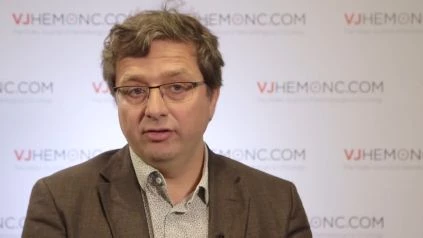Philippe Rousselot, MD, PhD from Versailles Hospital and University, Versailles, France, discusses the use of blinatumomab in patients with acute lymphoblastic leukemia (ALL). blinatumomab is a class of bi-specific T-cell engagers (BiTEs) that works by targeting CD19 and CD3 antigens on B-cells. The drug works by bringing the T-cell to the blast and directly promoting lysis. Prof. Rousselot mentions that the toxicity profile is different to other drugs, for example there are no problems associated with the liver or the platelets. Toxicity for blinatumomab is more neurologically based, during the initial phases of the treatment and after the initial phases, it is considered to be a well-tolerated drug. Prof. Rousselot provides an overview of the recent TOWER study (NCT02013167) of blinatumomab and its potential in the treatment of relapsed/refractory ALL. He notes that results show remission rate increased by half, with a very good molecular response rate. However, survival is quite short, but it is better than with chemotherapy. Prof. Rousellot concludes by expressing the importance of thinking about combinations to use those antibodies. Recorded at the European Hematology Association (EHA) 2016 Annual Congress in Copenhagen, Denmark.
[the_ad id="32629"]

